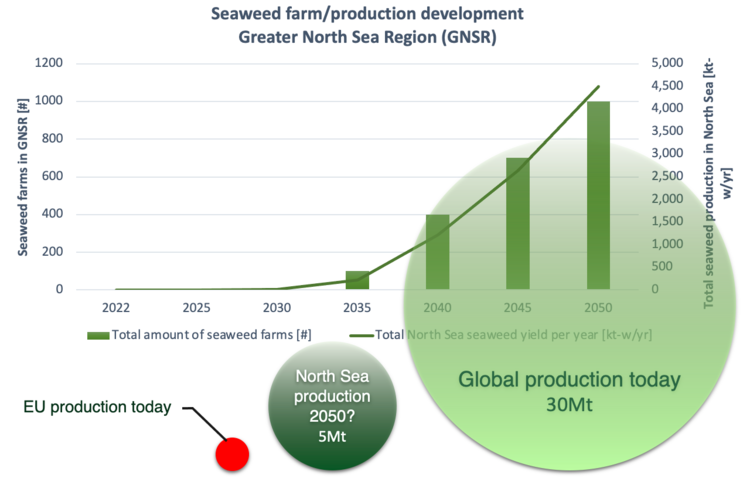WHAT IS NEEDED: 10 ACTION POINTS FOR 2030
1. Set a European (EU commission driven) target for the production of circular resources at sea
a. Create an incentive for EU/European countries to develop specific seaweed subsidy programs including multi-year (>10yr) exploitation subsidies for seaweed projects
b. For example: create an EU directive that requires a replacement of xx% of domesticly produced non-circular fossil or agricultural resources with local circular resources.
2. Encourage European countries to set up programmes to financially support exploitation (longterm) and innovation (short-term) of seaweed projects
a. Provide multi-year (>10yr) operating/exploitation subsidies for seaweed (farm) projects
b. This risk reduction measure helps project developers to attract funding and start more seaweed farm developments. These farms are essential for innovation and cost price reduction.
3. Communicate best practices on permitting and licensing procedures for seaweed farm operations throughout Europe
a. So countries may adopt best practices leading to more successful applications and more farms in Europe in less time
b. Also, governments are advised to include co-use as standard requirement in tenders for offshore wind farms, and
c. Finally, governments are advised to facilitate co-use projects with surveys, security measures, (financial) insurances and infrastructure
4. Work towards uniform European regulations on seaweed production and the 4 most important seaweed markets: food (ingredients), feed (additives), biostimulants (ingredients) and biobased materials.
5. Support research into validation of the ecosystem services of seaweed production & applications
a. so that the value of the seaweed economy becomes visible to policymakers, the market and consumers in terms of CO2 reduction, biodiversity & nature restoration and nitrogen absorption (or eutrophication).
6. More support from national government policy makers to help the seaweed industry developments:
a. Create more capacity at government ministries to directly support seaweed opportunities & challenges,
b. Collaboration with policy makers from existing industries is suggested as the emerging seaweed industry can provide solutions for agriculture, fisheries and fossil industries
7. Develop a central platform for sharing state-of-the-art scientific knowledge on seaweed cultivation, processing, and products, aiming for a fact-based overview to support the industry and its stakeholders
8. Stimulate the awareness of seaweed as a sustainable & local resource and the benefits of seaweed-containing products among market parties and consumers through marketing and communication.
9. Develop and communicate a clear positioning of locally and nature-inclusive grown seaweed in relation to imported or wild harvest seaweed.
10. Establish a European advisory committee of research and industry experts to identify state-of-the-art and promising developments to inform the industry and new subsidy programmes
DO YOU WANT TO GIVE FEEDBACK?
The presentation, the results of the poll inputs and their (initial) evaluation can be found on our knowledge database (available for NSF members only). If you have feedback on/suggestions for the 10 Action Points, feel free to share your those via this link.
